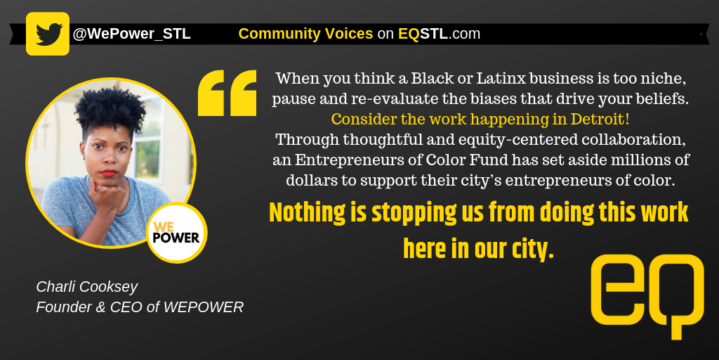
7 Regional Imperatives to Strengthen the Impact of our Entrepreneurship Ecosystem
WEPOWER is launching a new accelerator for Black and Latinx founders of early-stage companies. WEPOWER's Founder and CEO, Charli Cooksey, explains what we as a business community can do to drive systemic change in St. Louis.
Next week marks the launch of the full application for Elevate/Elevar, WEPOWER’s new accelerator for Black and Latinx founders of early-stage companies committed to St. Louis.
The accelerator acknowledges and celebrates the vast untapped potential of Black and Latinx entrepreneurs and the urgent opportunity to spark economic development and wealth building in low-wealth communities.
As we grow a community of successful and community-driven companies led by socially conscious entrepreneurs of color, we know it will also impact the diversity of our business community. Today, St. Louis’ business community holds significant power over regional policy initiatives, yet does not fully reflect the rich diversity of the region, particularly those who are underrepresented, overlooked, and directly impacted by racial inequity.
As we transform the makeup of the business community, we will transform the ways in which power is shared with and activated by impacted Black and Latinx communities. We will fundamentally pivot our region away from short-sighted solutions that keep divested communities segregated and stuck in cycles of poverty and shift towards a day where we are better because we value every person in every community, and the ideas that manifest from collaboration and collective action.
Shifting the ways emerging and current business leaders build with—instead of for—these communities will elevate our region towards high-impact, sustainable solutions to systemic problems and wealth that is equitably distributed.
Still, to achieve this transformation, our entrepreneurship ecosystem needs more than an accelerator. We need all hands on deck!
1. Prioritize Continuous and Transparent Data Collection and Analysis
We can’t change what we can’t measure.
We need an entity to house region wide data on entrepreneurs and the impacts of existing entrepreneur support organizations; and we need to update the data annually. Let’s support the data work being launched by St. Louis’ Equity in Entrepreneurship Collective.
Transparency isn’t about revealing failures, it’s about learning lessons from the data at hand and continuously improving for the sake of building a better St. Louis. Work like this is being done all across the United States by leaders like the Global Accelerator Learning Initiative and Entrepreneurship Database Program at Emory University.
2. Apply a Racial Equity Lens to the Work of Supporting Entrepreneurs
Don’t just collect and analyze data, but disaggregate the data by race. Ensure community members of color have seats at the tables where decisions are made about entrepreneurship and entrepreneurship support.
As leaders in the entrepreneurship support ecosystem, build the capacity to apply a racial equity lens to key decisions, policies, programs, and the flow of resources. Good intentions aren’t good enough.
3. Invest in Companies Founded by Black and Latinx Entrepreneurs
There’s a moral and business case for making investments into Black and Latinx founders and their companies. Let’s shift from overlooking and underestimating to valuing and investing.
When you think a Black or Latinx business is too niche, pause and re-evaluate the biases that drive your beliefs. Consider the work happening in Detroit!
Through thoughtful and equity-centered collaboration, an Entrepreneurs of Color Fund has set aside millions of dollars to support their city’s entrepreneurs of color. Nothing is stopping us from doing this work here in our city.
4. Advocate
There are policies that directly and indirectly stifle the potential of Black and Latinx entrepreneurs and Black and Latinx communities living below the poverty line. Advocate among legislators to allocate resources towards equitable entrepreneurship support initiatives.
Advocate to shift from focusing on raising the minimum wage to embracing a living wage. Listen and support these community’s advocacy initiatives and calls for action so that policy change is driven by those most impacted.
5. Consider Entrepreneurship as a Path to Workforce Development
New companies create jobs. The Black and Latinx communities with whom we partner have a right to access living wage jobs.
Consider the industries in which you support entrepreneurs. Prioritize industries that can spark living wage jobs that don’t require a bachelor’s degree.
Partner with workforce development agencies to coordinate and build a pipeline of homegrown people.
6. Do Business with Black and Latinx-owned Companies
Consider what percentage of your contracts and business relationships are with Black and Latinx entrepreneurs. Checkout resources like For the Culture STL and the Hispanic Chamber to identify such entrepreneurs with whom you can do business.
7. Take a Systemic Approach to Strengthening our Startup Community
The transformative work ahead of us cannot be achieved through isolated impact or simple solutions. All of our work is interconnected.
Creating change will require us to be driven by a common agenda, to have shared measurements, to align our work so it is mutually reinforcing, and to be in continuous communication oriented towards action. We may not see the results within a year, but our investment of time, coordination, resources, and a commitment to do things differently and equitably will pay huge dividends down the road.
Get Involved
The Elevate/Elevar Founders’ Commitment to Community embodies this philosophy of collective power and prosperity in a set of principled actions.
- You don’t have to be in Elevate/Elevar to sign the Founders’ Commitment to Community, so sign on here: bit.ly/elevate-commitment
- Apply to Elevate/Elevar online through September 15th: bit.ly/elevate_app
- Learn more at ElevateAccelerator.org and nominate founders here: bit.ly/elevate_founder
